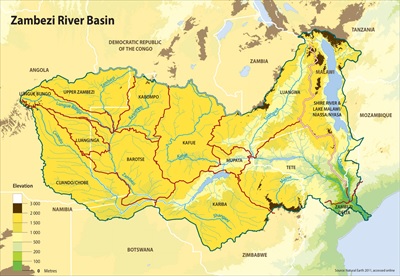As a key vehicle for stakeholder involvement on matters of the Basin consists of ZAMCOM’s constituents, the meeting was attended by representatives from National Stakeholder Coordination Committees (NASC). The NASCs comprise the broader basin Committee known as the Basin-wide Stakeholder Coordination Committee (BASC). BASC members thus formed a key component of the inaugural meeting, alone with strategic partners such as Global Water Partnership Southern Africa (GWPSA), IUCN, WWF, WaterNet, Institute of Water and Sanitation Development, SARDC and the Okavango River Basin Water Commission. In all, the consultation was attended by 51 partners.
During the opening address, Mr. Abraham Nehemia, Deputy Permanent Secretary, Ministry of Agriculture, Water and Forestry (Namibia), emphasised the necessity of building sustainable institutions in the sector through sharing knowledge beyond the technical level, networking and exchanging experience and ownership. He highlighted on the need for stakeholders to build on the motto “Together We can Understand Better”.
Head of the SADC Water Division, Mr. Phera Ramoeli, give emphasis to the “need to identify all stakeholders so that such forums benefits all sector stakeholders in the basin for peace and corporation”.
Observing that the consultative meeting was the 1st under the permanent ZAMCOM secretariat, Prof. Z. Phiri (ZAMCOM CEO), noted that the programme would provide an opportunity for improved appreciation of challenges (such as floods and droughts) and developments within the Basin. He noted that workshop presentations on the “Water-Energy-Food Security Nexus” (by SARDC) and “Floods and Droughts in the Zambezi Basin in the Context of climate change Adaptation” (By IWSD), would promote the exchange of knowledge and experience regarding various challenges, initiatives and processes in the Zambezi Basin.
Dr. Jefter Sakupwanya (CEO, Zimbabwe National Water Authority) in the keynote address further highlighted the needs and benefits of stakeholder engagement processes in enhancing Transboundary Cooperation through Stakeholder Engagement in the Zambezi Basin.
The programme sessions comprised other topics enabling stakeholders to share knowledge and experiences, and provide general advice and inputs that contribute to ZAMCOM’s initiatives, and Zambezi Basin developments. Other key sessions included:
- Capacity Development for Resilience in the Zambezi Basin, by WaterNet;
- Water resources development in the context of benefit sharing in the Zambezi Basin, by IUCN;
- Environmental flows for a sustainable and equitable Zambezi Basin development; and;
- NASC National Chapter presentations (A closed door meeting among NASC members was also held after the forum to discuss and identify issues needed for the effective management of the NASCs).
Echoing with the issues brought out during the opening session, the conclusions of the forum answered the two questions laid down at the beginning of the meeting: “What are the urgent matters for ZAMCOM in order to enhance transboundary cooperation?” and “How can stakeholder participation be further enhanced in the context of the basin?” The discussions pointed to the need for:
- Enhanced corporation by harmonising of policies within the Basin; including synchronising the approach of environmental flows; Selling the benefits of cooperation to all countries, communities, and target wider audiences, including identifying and protecting the needs of small-scale stakeholders
- Strengthening sustainability & Capacity Building by finding ways of keeping NASCs sustainable so that there is effective participation; strengthening capacity in teaching, learning and research in water by involving NASCs; and Incorporating both awareness & capacity for technocrats and communities on early warning systems.
- Enhancing Stakeholder Participation by eexploring ways of enhancing grassroot stakeholders beyond high-level audiences; Integrating WASH & WRM issues to be able reaching out to other stakeholders; engaging private sector and other sectors (agriculture, energy, mining etc); and conducting stakeholder mapping routinely in order to engage the right stakeholders in time.
- Engaging youth and mainstreaming gender through the implementation of the SADC mainstreaming project deliverables and recommendations.
The recommendations of the meeting are expected to help accelerate the implementation of ZAMCOMs work programme and strategic plan development process. GWPSA has worked with River Basin Organisations (such as ZAMCOM, LIMCOM and ORASECOM, and OKACOM in the SADC region to tackle various development challenges by effectively advancing the implementation of the IWRM framework. The forum was made possible by the support provided by International Cooperating Partners, notably: The Ministry of Foreign Affairs of Denmark (DANIDA); The World Bank, under the Cooperation in International Waters in Africa (CIWA) Multi-Donor Trust Fund; and The GIZ, under the German Federal Ministry for Economic Cooperation and Development.
